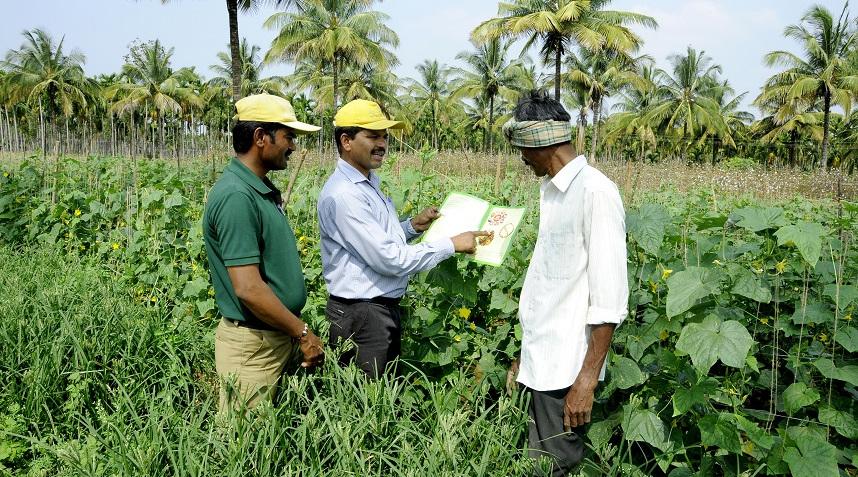Contract Farming: Whose Interest Does it Serve?

Image Courtesy: The Indian Economist
Prime Minister Narendra Modi announced at the World Food India programme hosted by Ministry of Food Processing Industries, Government of India, in partnership with Confederation of Indian Industry (CII), that the time was ripe for contract farming in the country. He said, “More investment is required in contract farming, raw material sourcing and creating agricultural linkages. Many international companies have taken lead in contract farming in India.”
This statement of the Prime Minister is significant for the fact that it shows that the policy of the government is to hand over the lands of the farmers to corporates and their agents, and the landlords in rural areas.
This policy has been pushed by the National Institution for Transforming India (NITI) Aayog, a body constituted for policy formulation after dismantling the Planning Commission. It had recommended in its paper on increasing agricultural productivity, to go for contract farming saying that the farmer would benefit with “contract farming under which the buyer can provide the farmer access to modern technology, quality inputs, other support and a guaranteed price.”
This paper did not even look at the act that the agricultural extension services of the country have suffered, from the government investing less than 2% of its budget on agriculture education and research. It also stated to dismantle the existing agriculture market committee where the farmers could go and sell their produce. This system ensured that the farmers would have some protection from the Agricultural Produce Marketing Committees (APMC) which existed in the local mandis. Only registered traders were allowed to take part in the purchase of the commodities. Though it was not a foolproof system, it at least had a semblance of protecting the farmers from getting cheated. In their place, the NITI Ayog has recommended to the states to amend their existing APMC Acts so that the buyers can directly approach the farmers to purchase.
In the paper, it also recommended that a land bank be created and “interested landowners may deposit their land parcels in the bank and potential cultivators may lease land from it.”
But in India, more than 85 percent of farmers are marginal or small farmers and the current agriculture policy followed by the government has made farming a loss-making vocation for them. Instead of having a policy address the issues of the farmers it has taken a policy to encourage contract farming that would make surrender their lands for the large companies to take over and hand it over to some larger farmer.
On this issue Economist Prof. Vikas Rawal spoke to Newsclick and said, “Contract farming ties farmers -- the majority of whom in India are marginal and small peasants -- to large monopoly agro-processing firms. In such unequal relationships, small producers are left at the mercy of large agro-processing firms. This has to be seen in the context of increasing scale of production and dominance of a few large players in the agro-processing industry, including in food-grain processing industry.”
He cautions and warns by stating that farmers would suffer from such a system, “Opening doors to large multinational firms to invest in India, with state facilitation of contract farming arrangements, is a dangerous step for Indian farmers. The direct relationship of large food processing firms with small producers will pave way for dismantling of public procurement system and further withdrawal of state intervention in ensuring remunerative prices to farmers.”
Similarly, the farmer organisations have voiced their apprehensions on the said policy. Vijoo Krishnan of All India Kisan Sabha (AIKS) speaking to Newsclick on the Modi government’s plan of inviting Multi National Companies (MNCs) into farming sector said, “This is going to affect the farmers as the companies would decide what would be the rent and prices paid to the farmers. It is going to be an unequal contract system as the companies in the name of meeting the quality standards would reject most of the produce and pay less.”
He said there are already companies that are involved in contract farm and added that “In Andhra Pradesh, an Israeli-American Company has taken up contract farming in a place called Kuppam and they are growing crops that would be used in bio-fuel. Other big corporations like ITC, TATA and Pepsico are into contract farming and only procure items that are used in fast foods items – like chips, biscuits etc. We would be compromising on the food security of the country”
He gave the example of an MNC, Toyota Tsusho Sugar Trading Limited (TTSTL) that is to be set up in Andhra Pradesh and if the company is to continue with the new policy, it can directly buy sugar cane from the farmers at the price it determines and this would have an impact on other farmers and local sugar mills which would not have to give the mandated minimum support price (MSP).
In the hurry to push for contract farming in the country, are we going to further displace the farmers and push them to destitute?
Get the latest reports & analysis with people's perspective on Protests, movements & deep analytical videos, discussions of the current affairs in your Telegram app. Subscribe to NewsClick's Telegram channel & get Real-Time updates on stories, as they get published on our website.























